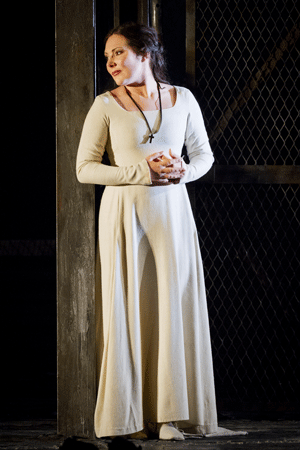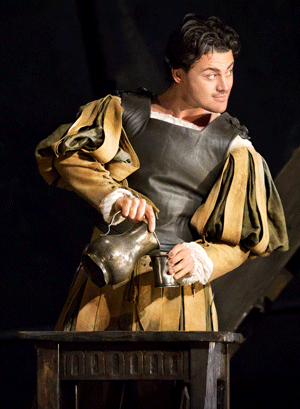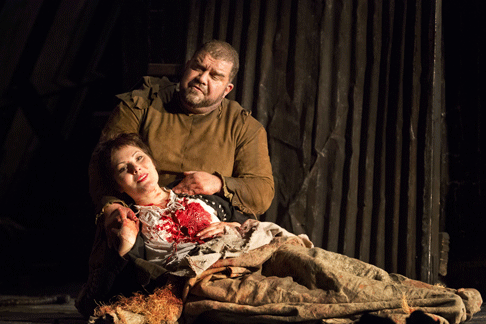There’s a lot to be learned from period practice, and anyone who knows it
well knows how rambunctious it can be. Gardiner knows the Renaissance was
violent. Verdi isn’t sentimental and the court at Mantua was cruel. This was
historically-informed practice adapted to repertoire often milked for lush
effect. Gardiner’s vigorous approach might not appeal to all, but it’s
extremely perceptive. He makes Rigoletto raw and shocking, as it
should be.
 Ekaterina Siurina as Gilda
Ekaterina Siurina as Gilda
David McVicar’s 2001 production is bleak. The ducal palace is evoked by a
metallic wall — shiny but hard. Michael Vale, the designer, uses a large
wooden structure that pivots like the twists in the plot, but the focus remains
on the cast. Vocal performances take their cue from Gardiner and McVicar.
Vittorio Grigolo bursts onto the stage in full throttle. “Questa o quella”
is thrown like a gauntlet. The Duke doesn’t brook challenge. Grigolo has the
power and showmanship to create the Duke, bursting with arrogant machismo. Like
the Duke, he’s a force unto himself. The courtiers are a mob for whom
subtlety means nothing. Grigolo’s Duke uses swagger as a weapon. The Duke’s
brutishness come over well, moments of decorative richness adding a touch of
devious artifice, totally in keeping with character.
 Vittorio Grigolo as Duke of Mantua
Vittorio Grigolo as Duke of Mantua
Yet Grigolo also manages to suggest the Duke’s inner fragility. With
Gilda, he can play the man he might have been had he not been born to a crown.
The duet with Gilda is genuinely tender. In “Ella mi fu rapita”, Grigolo
let the Duke’s mask drop for a moment, singing with genuine tenderness. In
many ways this is the heart of the opera for it touches on the Duke’s inner
psyche. Significantly, Verdi keeps cutting “La donna Ë mobile” so the
sections don’t connect. Gardiner emphasizes the disjoint, for by this stage,
the Duke is back to his old tricks, morally disintegrating again. Grigolo is a
consummate actor and creates the part with more depth than he’ll get credit
for. The problem is that the Duke himself is hard to pin down.
There have been so many great Rigolettos over the years that Dimitri
Platanias has a lot to live up to. This was his Covent Garden debut, though he
has done the role many times elsewhere. McVicar’s concept has Rigoletto
crawling like a broken spider, which is perfectly valid. Platanias is
physically imposing, with a voice to match, so a different concept would
perhaps suit him better. Platanias does Rigoletto’s anger rather than his
anguish. His dialogues with Gilda show Rigoletto’s fatherly side, but don’t
access the demented, tortured soul within. Nonetheless, he’s a good
counterbalance to Grigolo’s Duke and to Matthew Rose’s Sparafucile, sung
with the power of an amoral force of nature. Rose doesn’t need to invest the
part with histrionics. To Sparafucile, murder is a business transaction without
emotional meaning. Rose’s detachment is chilling in itself. In his exchanges
with Christine Rice’s Maddalena, Rose’s sibilants cut with suppressed
sexual violence. They’re not “brother and sister” in the modern sense of
the term, but pimp and whore.
 Dimitri Platanias as Rigoletto and Ekaterina Siurina as Gilda
Dimitri Platanias as Rigoletto and Ekaterina Siurina as Gilda
Ekaterina Siurina is an impeccable Gilda. It’s her signature role with
which she debuted with Dmitri Hvorostovsky at the age of nineteen. A
beautifully rounded, sensual “Caro nome” expresses the passion in Gilda’s
personality, making her love for the Duke perfectly plausible. Gilda is too
sheltered to articulate her feelings, but her instincts burst forth.
Siurina’s clear, ringing timbre and perfect pitch make the long cadenzas
bloom with promise, expressing emotions that words can’t convey. This
intensity makes her sacrifice believable too. When Siurina appears dressed as a
boy, her voice glows with purpose, for she’s found a way to fulfill her love
in a sacrifice only a cloistered Catholic innocent might chose. Ironically,
Rigoletto loses his child because she’s been brainwashed by her
upbringing.
This was an extremely rewarding Rigoletto because it cuts past
surface glamour and goes to the visceral drama.
The performance on 17th April will be broadcast live internationally in HD
cinemas.
Anne Ozorio
image=http://www.operatoday.com/Rigoletto_ROH_2012_05.gif
image_description=Dimitri Platanias as Rigoletto [Photo © ROH 2012 / Johan Persson]
product=yes
product_title=Giuseppe Verdi: Rigoletto
product_by=Duke of Mantua: Vittorio Grigolo; Matteo Borsa: Pablo Nemsch; Count Ceprano: Jihoon Kim; Countess Ceprano: Susana Gaspar; Rigoletto: Dimitri Platanias; Marullo: Zhengzhong Zhou; Count Monterone: Gianfranco Montresor; Sparaficule: Matthew Rose; Gilda n: Ekaterina Siurina; Giovanna: Elizabeth Sikora; Page: Andrea Hazell; Usher: Nigel Cliffe; Maddalena: Christine Rice. Royal Opera Chorus. Orchestra of the Royal Opera House. Conductor John Eliot Gardiner. Stage Director David McVicar. Royal Opera House, London, 30th March 2012.
product_id=Above: Dimitri Platanias as Rigoletto
Photos © ROH 2012 / Johan Persson